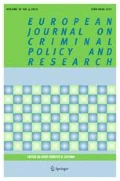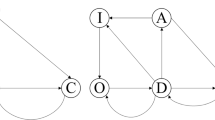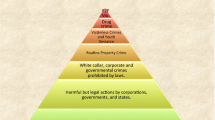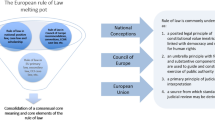Abstract
This paper explores historical predecessors and contemporary contexts of crime prophecy. It places the question of crime risks of proposed European Union regulatory and legislative proposals in the context of ‘Impact Assessment’ of legislative proposals by the European Commission and also in the wider context of scrutiny by the European Parliament and (possibly) by national parliaments of Member States. From this context is deduced a requirement that, in order to be fit for its purpose, assessment methods must be easy to communicate and simple to apply.
Similar content being viewed by others
Notes
Throughout this and the immediately following pages, we draw on the work of Wood 2003.
In this respect, they are like many business executives whose bonus policies directly or indirectly encourage mis-selling of financial services products.
See inter alia Article III-259, ’National Parliaments shall ensure that the proposals and legislative initiatives submitted under Sections 4 and 5 of this Chapter comply with the principle of subsidiarity, in accordance with the arrangements laid down by the Protocol on the application of the principles of subsidiarity and proportionality.’
For an updated web site dedicated to progress on the Impact Assessment, see http://europa.eu.int/comm/secretariat_general/impact/index_en.htm
The coverage is as follows: economic impact (competitiveness, markets, trade and investment flows; direct and indirect costs imposed on businesses; administrative requirements imposed on businesses; innovation and research; households; specific regions, sectors or workers; third countries and international relations; public authorities; the macroeconomic environment), environmental impact (air quality; water quality and resources; soil quality or resources; the climate; renewable or non-renewable resources; biodiversity, flora, fauna and landscapes; waste production/generation or recycling; mobility (transport modes) and the use of energy; the environmental consequences of business activities), and social impact (employment and labour market access; job quality; social inclusion; social rights and standards; consumer rights; governance and participation; public health and safety; access to social protection, health and educational goods and services) (European Commission, 2004a).
References
European Commission. (2000). Communication from the commission on the precautionary principle. Brussels, COM(2000)1, 2 February, 29 pages, http://europa.eu.int/comm/dgs/health_consumer/library/pub/pub07_en.pdf.
European Commission. (2004a). SEC(2004)1377, Commission staff working paper. Impact assessment: Next steps. In support of competitiveness and sustainable development. Brussels, 21 October, pp 15, http://europa.eu.int/comm/secretariat_general/impact/docs/progress_report_council_sec_1377.pdf.
European Commission. (2004b). Impact assessment in the commission: Guidelines. Brussels, 28 pages, http://europa.eu.int/comm/secretariat_general/impact/docs/ia_guidelines.pdf.
European Commission. (2004c). Impact assessment in practice, http://europa.eu.int/comm/secretariat_general/impact/practice.htm.
European Commission. (2004d). Commission staff working paper: Proposal for a framework decision on certain procedural rights in criminal proceedings throughout the European Union: Extended impact assessment. COM(2004)328 final, SEC 491, Brussels, 28 April, 38 pages.
European Commission. (2004e). Commission staff working paper: Proposal for a council decision establishing the European refugee fund for the period 2005–2010. Extended impact assessment. COM(2004)102 final, Brussels, 12 February, SEC 161, 26 pages. http://europa.eu.int/comm/secretariat_general/impact/docs/SEC_2004_0161_1_EN.pdf.
European Commission. (2004f). Call for tender published in the Official Journal of the European Communities no. 2004/S 217-186181 of 06/11/2004, Annex 5: Proposals that have been identified to be subjected to crime proofing 2004, 2 pages, http://europa.eu.int/comm/justice_home/news/tenders/wai/news_tenders_186181_en.htm..
European Union. (2004). Treaty establishing a constitution for Europe [new Rome Treaty]. Official Journal of the European Union, C 310, Volume 47, 16 December, ISSN 1725–2423. http://europa.eu.int/eur-lex/lex/JOHtml.do?uri=OJ:C:2004:310:SOM:EN:HTML.
Freestone, D., & Hay, E. (1996). Origins and development of the precautionary principle. In D. Freestone & E. Hay (Eds.), The precautionary principle and international law, the challenge of implementation. The Hague: Kluwer.
Giddens, A. (1989). Sociology (p. 18). Cambridge: Polity Press; & Oxford: Basil Blackwell.
Marchant, G., & Mossman, K. (2004). Arbitrary and capricious: The precautionary principle in the European Union courts. Washington DC: AEI Press (publisher for the American Enterprise Institute) and London: Eurospan, 105 page book, ISBN 0-8447-4189-2 in paperback, electronic version at http://www.aei.org/docLib/20040806_book787text.pdf.
Schur, E. (1973). Radical non-intervention: Rethinking the delinquency problem. Eaglewood Cliffs, NJ: Prentice-Hall/Spectrum Books.
United Nations Conference on Environment and Development. (1992). Rio Declaration on Environment and Development, Rio de Janeiro, 3 to 14 June. Nairobi: United Nations Environmental Programme, http://www.unep.org/Documents/Default.asp?DocumentID=78&ArticleID=1163.
Vander Zwagg, D. (2002). The precautionary principle and marine environmental protection: Slippery slopes, rough seas and risking normative tides. Ocean development and International Law, 33(2), 165–188.
Wood, M. (2003). The road to Delphi: Scenes from the history of oracles. New York: Farrar, Straus and Giroux.
Acknowledgment
On behalf of Cardiff University, the authors gratefully acknowledge a grant by the European Union’s Sixth Framework Programme, Priority SSP/8, proposal number 1501634, project ‘MARC’.
Author information
Authors and Affiliations
Corresponding authors
Rights and permissions
About this article
Cite this article
Dorn, N., Levi, M. From Delphi to Brussels, The Policy Context: Crime Prophecy, Proofing, Assessment. Eur J Crim Policy Res 12, 213–220 (2006). https://doi.org/10.1007/s10610-006-9021-4
Received:
Accepted:
Published:
Issue Date:
DOI: https://doi.org/10.1007/s10610-006-9021-4




